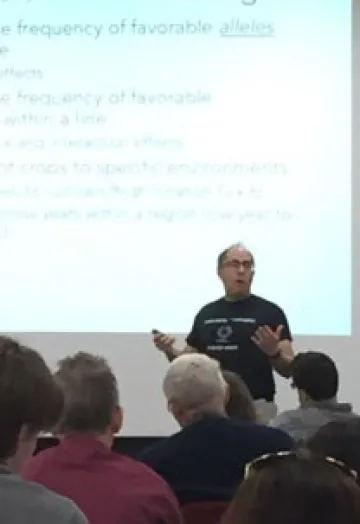
Bruce Walsh, Ph.D
Professor, Departments of Ecology and Evolutionary Biology, Animal Sciences, Plant Sciences, Molecular and Cellular Biology, University of Arizona
Member, BIO5 Institute
Research Interest: Bruce Walsh's interests are broadly in using mathematical models to explore the interface of genetics and evolution, with particular focus on two areas: the evolution of genome structure and the analysis of complex genetic characters (aka quantitative genetics).Bruce (along with Mike Lynch) is coauthor of Genetics and Analysis of Quantitative Traits and the forthcoming Evolution and Selection of Quantitative Traits.
Webpage: http://eeb.arizona.edu/people/dr-j-bruce-walsh
 Lucia Gutierrez, Ph.D.
Lucia Gutierrez, Ph.D.
Associate Professor, Cereals Breeder and Quantitative Geneticist
Department of Agronomy, University of Wisconsin-Madison
Research Interest: Dr. Gutierrez is an Associate Professor and the Cereals Breeder and Quantitative Geneticist in the Department of Agronomy at the University of Wisconsin-Madison. She is also affiliated with the Plant Breeding and Plant Genetics graduate program and Center for Integrated Agricultural Systems. Her research focuses on understanding the genetic architecture of complex traits and their response to the environment. She integrates state of the art genotyping technologies with large phenotyping experiments to study complex traits. She studies the mechanisms employed by plants for local adaptation including the study of biotic and abiotic interactions. Her research program has also an applied component, which combines strong theoretical development, genomic tools, and high throughput phenotyping to release cereals cultivars to serve the U.S. agricultural systems.sistently grounded in real-world production and is pursued with a firm commitment toward deployment.
Webpage: https://cereals.agronomy.wisc.edu/members/lucia-gutierrez/
